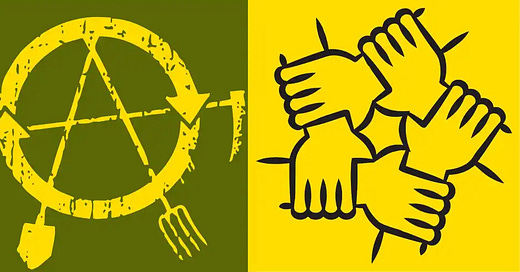Prefigurative politics are the modes of organization and social relationships that strive to reflect the future society being sought by the group. According to Carl Boggs, who coined the term, the desire is to embody “within the ongoing political practice of a movement […] those forms of social relations, decision-making, culture, and human experience that are the ultimate goal”.[1] Prefigurativism is the attempt to enact prefigurative politics.
Resistance to a dysfunctional and increasingly dystopian system takes many forms. It’s about a lot more than protests on the streets. While protests may be a way of letting off steam, more often than not, they don’t contribute towards building the new world we desire. In part, resistance is about flying under the radar of the authorities. It’s about starting to build the new world we want to see inside the shell of the increasingly dystopian one we’re currently forced to endure.
Marching is great for bonding with like minded people, making links and building networks, but if a protest gets scant coverage, was it worth the effort of mobilising for it and the risk of getting arrested? Or worse, assaulted by the cops…
Being against the system doesn’t just mean engaging in reactive activity to events. It’s also about showing the kind of world we want to move towards and fight for. It’s about building the social and community structures we need, so that when revolution does come, we have the foundations ready for the new world we want. It’s about the kind of prefigurative action we can engage in to bring this about. It’s not separate from revolution – it’s an integral part of the process of revolution.
It’s not just about the physical stuff such as community gardens, community kitchens, food banks, clothing banks and the like. It’s about learning to work with each other in a collective, non-hierarchical way. It’s about finding and developing ways of working and learning that enables people to grow and develop.
It’s offering a positive glimpse of what the future will be. Ordinary people don’t tend to react well to images of street confrontations. We know that’s largely down to the negative and very often false stereotypes that the media put on us. Ordinary people will however, be a lot more receptive to grassroots initiatives that are starting to make a positive difference in the communities where they’re based.
Obviously, there’s only so far a grassroots initiative can go before hitting the constraints imposed by the system we have to live in. Experiencing the impact of those limits and understanding why they’re there is a way for people to understand why radical change is needed and why existing power structures have to be swept away.
People will understandably want to see examples of grassroots projects that have an intention of bringing about real change. The thing to bear in mind is that no two grassroots projects will be the same. Each one will have evolved to deal with a specific set of circumstances in their neighbourhood. For sure, generalities can be made when it comes to why a neighbourhood needs a foodbank or a community garden. But, there will always be specifics, not least regarding the people involved in the project.
In The Directory there’s a list of all the grassroots community projects across Bath, Bristol and the surrounding settlements that we’re currently aware of who, each in their own way, are doing their best to make the world a better place to live in. Whether they would define what they do as prefigurative let alone anarchist is possibly open to debate. Regarding that, we’ll leave you with this quote and link:
The anarchist conclusion is that every kind of human activity should begin from what from what is local and immediate, should link in a network with no centre and no directing agency, hiving off new cells as the original grows.
As for The Directory, needless to say, it's a work in progress that is constantly being added to. Any help in doing this or suggestions as to how we can improve The Directory will be greatly appreciated:) Each of these projects has a different story and background we can all learn from. One of the aims of setting up At the Grassroots is to encourage these groups to talk to each other to exchange experiences, ideas and skills with the hope that what emerges is considerably greater than the sum of its parts.





